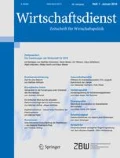Zusammenfassung
Soziale Netzwerke, Suchmaschinen und der Online-Handel zeichnen sich auf den ersten Blick dadurch aus, dass hier sehr große Unternehmen den Markt beherrschen. Ob dies aber zu Wettbewerbsbeschränkungen führt, wie digitale Märkte sinnvoll abzugrenzen und wie faire Marktbedingungen herzustellen sind, darüber diskutieren die Autoren des Zeitgesprächs.
Abstract
Digital content and services providers like Alphabet (formerly Google) or Facebook have become an indispensable part of our everyday lives and are among the highest valued firms in the economy as a whole. Most digital markets are characterized by direct and indirect network effects and therefore also by so-called two-sided platforms. To date it is not clear to how much market power these firms actually possess, which is a prerequisite for a possible policy intervention. The authors discuss measuring market power within the existing European legal framework and propose new legal rules in the field of digital markets. As the limitations of current instruments such as the SSNIP test point out, new approaches for the analysis of markets in the context of Internet-based platforms are necessary. The authors prefer modifying competition law to sector-specific regulations of internet-based businesses. They also discuss the implications that the use of big data has on competition policy. The author Günter Knieps focusses on the network evolution of the future all-IP Internet, which should neither be disturbed by regulatory technology policy nor by network neutrality regulation.
Author information
Authors and Affiliations
Corresponding author
Additional information
Prof. Dr. Jan Krämer ist Inhaber des Lehrstuhls für Wirtschaftsinformatik mit Schwerpunkt Internetund Telekommunikationswirtschaft an der Universität Passau.
Prof. Dr. Ralf Dewenter lehrt Industrieökonomik an der Helmut-Schmidt-Universität in Hamburg.
Prof. Dr. Daniel Zimmer, LL.M., ist geschäftsführender Direktor des Instituts für Handels- und Wirtschaftsrecht und des Center for Advanced Studies in Law and Economics (CASTLE) der Universität Bonn und war bis vor kurzem Vorsitzender der Monopolkommission.
Dr. Iris Henseler-Unger ist Geschäftsführerin und Direktorin des Wissenschaftlichen Instituts für Infrastruktur und Kommunikationsdienste (WIK) in Bad Honnef.
Dr. René Arnold ist Leiter der Abteilung Märkte und Perspektiven des Wissenschaftlichen Instituts für Infrastruktur und Kommunikationsdienste (WIK) in Bad Honnef.
Christian Hildebrandt, Dipl.-Volkswirt, ist wissenschaftlicher Mitarbeiter der Abteilung Märkte und Perspektiven am Wissenschaftlichen Institut für Infrastruktur und Kommunikationsdienste (WIK) in Bad Honnef.
Prof. Dr. Günter Knieps ist Direktor des Instituts für Verkehrswissenschaft und Regionalpolitik der Albert-Ludwigs- Universität Freiburg.

